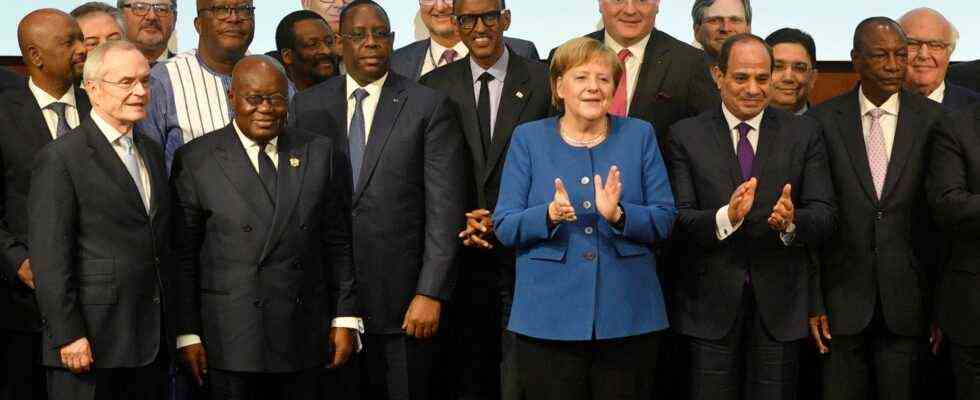As of: 08/27/2021 3:19 p.m.
At her meeting with heads of state and government from African countries, the Chancellor called for closer economic cooperation. But what does Merkel’s Africa policy look like after 16 years in office?
You have come to consult with Angela Merkel: numerous heads of state and government from Africa as well as the chairmen of international economic and financial organizations. At the start of the meeting in the Chancellery, the President of the African Development Bank, Akinwumi Ayodeji Adesina, thanked for the invitation. Addressing Merkel, he said: “You are a friend of Africa. We write your name in gold letters.”
It was only in the course of his speech that he disguised biting criticism, disguised in diplomatic rhetoric: Only 2.4 percent of Africans have access to corona vaccines. While Health Minister Jens Spahn is thinking publicly about stockpiling vaccines, the vaccine is missing in the poorest countries in the world. “Africa shouldn’t have to beg for vaccines,” said the banker.
The federal government has so far successfully fought against the revocation of the patents for vaccines and thus against vaccine production in Africa. No wonder. Because the Chancellor was rarely only concerned with the well-being of Africans during her entire term of office.
In Merkel’s travel diplomacy, sub-Saharan Africa did not initially take place. Although she had visited the continent four times in her first two terms, she mainly traveled to the comparatively affluent South Africa. From July 2011 to October 2016, the Chancellor never set foot on African soil. Until then, she only knew the Sahel zone from hearsay. That changed fundamentally with the refugee crisis.
Bulwark against refugees
Like its neighboring country Mali, Niger is one of the poorest countries in the world. Merkel only visited these two countries in October 2016 after the refugee crisis. Your mission: to contain the flow of refugees. Smugglers mostly smuggled young men from the poorest countries in Africa through the desert.
The Chancellor wanted to close this gate to the West – and found an ally in the Nigerien President Mahamadou Issoufou in particular. She received him at Meseberg Castle, and twice in the Chancellery. In return for the fight against people smugglers, Merkel promised more development aid.
Bulwark against terrorists
With the Islamist terrorist attacks in Europe, especially the Paris attack in November 2015, Merkel made the fight against terrorism a top priority. Their path therefore led them back to the Sahel countries, from where not only refugees, but also terrorists and explosives came to Europe. In November 2019, she met with the heads of state of Mali, Burkina Faso, Niger, Chad and Mauritania. The Chancellor made pledges for further aid, including for military equipment. In return, they expected military surveillance of the Sahel zone.
The Bundeswehr is also to help, as part of the UN mission in Mali. It is the largest foreign assignment in Germany – and the most dangerous. Her sentence was heard: “The terrorists are quick, and therefore we have to be faster.”
Mali and Libya
Merkel’s mission in West Africa served peace in Europe. Their commitment is undisputed, but their success is questionable. The security situation in the Sahel in particular deteriorated with the military coup in Mali in August 2020. “There needs to be more dialogue and political attention,” says Gerrit Kurtz, Research Fellow for Crisis Prevention of the German Society for Foreign Policy. Merkel paid particular attention to Libya. In 2019 she initiated the Berlin Libya Conference – an international consultation format to stabilize the failed state, in which Russian President Vladimir Putin is also involved.
“Compact with Africa” initiative
When Merkel receives ten African presidents, it is primarily about the industrialization of Africa. But even that is not an act of charity. Günter Nooke, the Federal Government’s Africa Commissioner, justified the summit meeting with the “Frankfurter Allgemeine Zeitung” with a horror scenario: If Europe does not want “Hundreds of millions of Africans to emigrate to Europe as labor migrants” over the next few decades, investments in Africa are necessary.
“Compact with Africa” is the name of the initiative that Merkel initiated at the G20 summit in Hamburg in 2017. It is also about promoting the German economy. “That is her great legacy,” says Volker Treier, head of foreign trade at the German Chamber of Commerce and Industry (DIHK). Merkel had already seen Africa as a business partner for German companies since the G8 summit in Heiligendamm in 2007. Since then, direct investment has risen continuously.
In August 2018, Nigeria was one of the stops on Merkel’s Africa trip.
Image: dpa
Müller’s “Marshall Plan with Africa”
The Chancellor left the development policy accents such as combating poverty to her committed Federal Minister for Economic Cooperation, Gerd Müller (CSU). With his “Marshall Plan with Africa” in 2017 he laid the foundation stone for German development policy in Africa. “We need a paradigm shift and must understand that Africa is not the continent of cheap resources, but that the people there need infrastructure and a future,” said Müller.
However, he met with displeasure in German industry. The federal government did not always consistently finance the infrastructure in Africa that German companies needed. In addition, the supply chain law puts companies in shackles. “I am lacking honesty,” says Treier. Honesty also means that Africa was largely left in the lurch in the corona pandemic.

